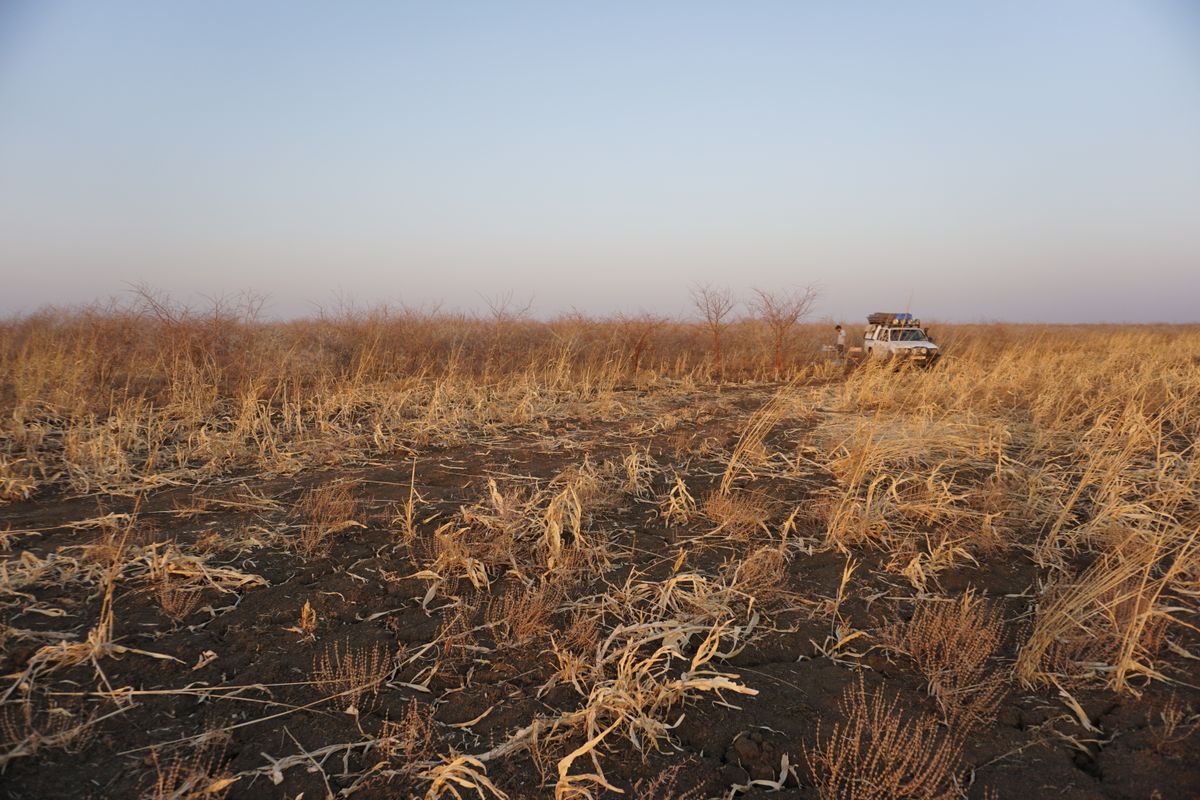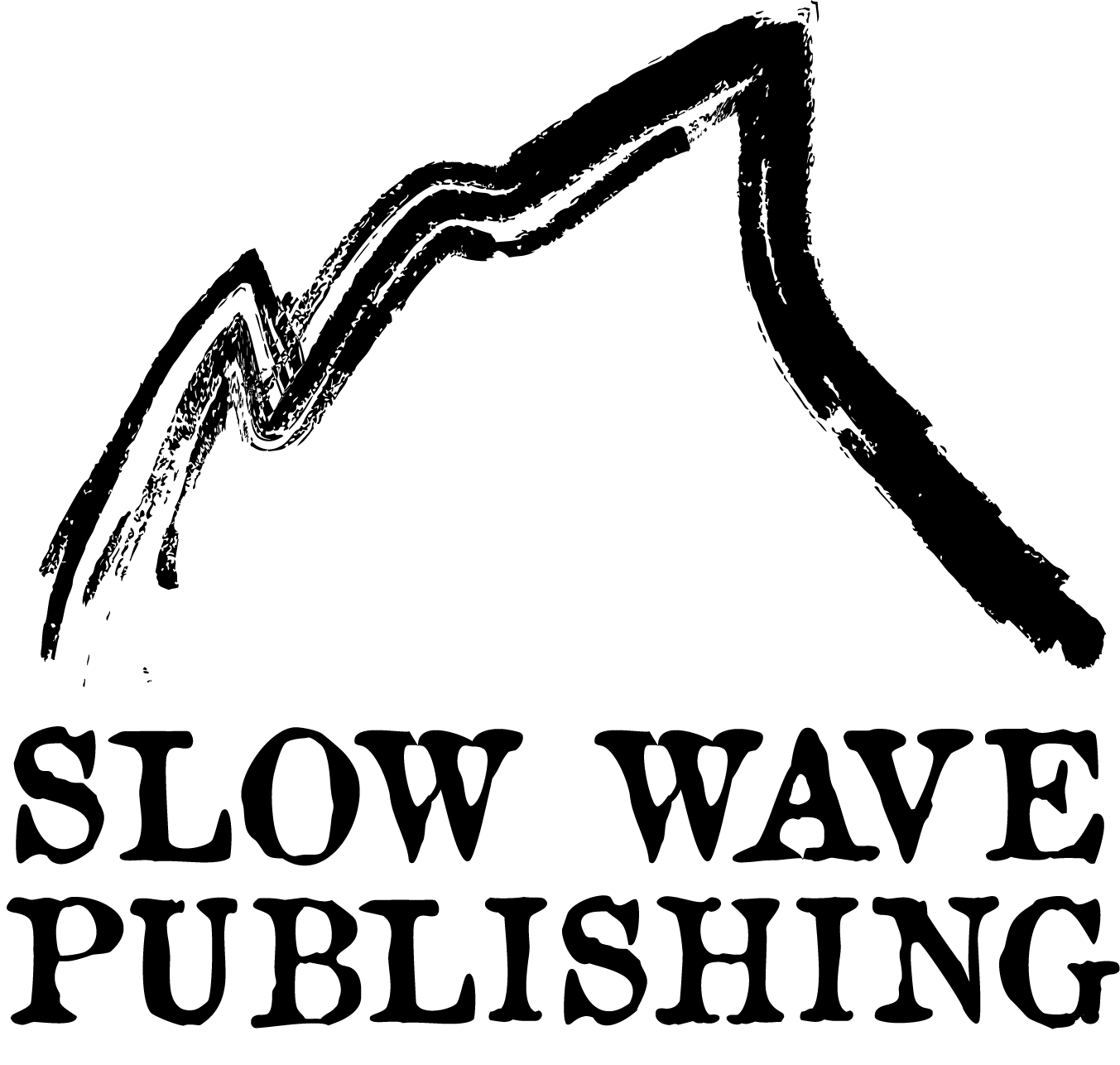Dinder National Park

This is an excerpt from my book, This is The Place. Here, George and I are getting ready to camp in Dinder National Park, in Sudan. This was after spending several weeks in Khartoum and Port Sudan, which are two of the larger cities in the country. We had been assured that "most" the lions were gone from the park. We found a spot and started setting up camp...
All names have been changed.
We hadn’t been at it five minutes when we noticed a pickup truck speeding towards us, kicking up dust as it scrambled across the bone dry ground. It pulled up a few metres from us, breaking suddenly and skidding a little, the tyres scratching against the gritty earth. Two men sat on the cargo bed and two were in the cab. After the truck had stopped, they all climbed out and walked over to us. The two men who had been travelling in the front were the oldest, although there was twenty years between them. The two in the back were young—teenagers, really. All of them wore the traditional white thobe, and over the top they had Victorian-style waistcoats like the Beja people in Port Sudan; but these men were shorter and stockier, and they approached without any of the preamble or ritual of a big greeting that we had grown accustomed to in the rest of Sudan. When they reached us, the oldest man shook our hands and spoke quickly in Arabic. His voice was hoarse.
The men started going through the stuff we had on the tables. They picked up the multi-burner and George made a fire noise and then I mimed cooking on top of it. They put it down and picked up the collapsible cup, which popped out into a regular cup shape as they lifted it, and they mimed drinking. We nodded and said, “Na’am,” which we thought meant ‘Yes,’ and they laughed and tossed the cup back onto the table. They were just making sense of the pressure cooker when a yell went up from over near the truck, and we all hurried over to find the source of the noise. The youngest guy was looking through our windscreen. He turned and said something to the others.
They gathered around the window talking to each other, and then the man with the hoarse voice looked over to us and mimed driving, pointing to the right of our car where the driving wheel was. Then he pointed to their own truck and to their driving seat, which was on the left.
George said, “It’s an English truck, we drive on the left.” They walked back to us and said, “English? English?” to us questioningly. We said, “Na’am, English,” and then I pointed at George and myself and said, “English.”
The leader with the hoarse voice looked around our camp with some reproach and mimed sleeping. We said, “Na’am.” He shook his head saying, “Laa,” which means ‘No,’ and then some words we didn’t understand. Then he mimed something prowling, which we thought could have meant either lion or hyena, and then he gestured for us to get into our truck. Without speaking the same language, we couldn’t reason with him at all, so we just packed up and did as he said. We didn’t have any better ideas.
The men had taken on a new efficiency, and they organised themselves without seeming to pay any attention to us. When we were ready to go, he told the rest of the guys to get into their truck, and then he climbed in with us, giving George directions while speaking loudly in Arabic and gesturing with his hands. The other truck followed us. Although I couldn’t understand them, the men felt hostile to me. I got so nervous that I had that metallic taste in my mouth that you get when your heart is beating hard. Slowly, so no one would notice, I slid my hand down the side of my seat where I kept my hunting knife and held on to it.
It was dark when we pulled into their camp, which was made up of a few squat tents with thin wooden frames covered in thick fabric. Surrounding the camp there were patches of amber light, like campfires burning in the distance, and we could hear the sound of livestock. I couldn’t identify the species on noise alone. The car stopped and children ran over to us, and the men from the other truck came and gestured for us to get out, and because I couldn’t climb out with an eight-inch hunting knife, I gave in and dropped it and did what George did, following the hoarse-voiced man over to the fire, where he sat us down and we exchanged names. He said his name was something like John, and when we asked him if it was really John, he nodded and put his hand to his chest, repeating “John,” so we went with it.
John went away and returned with a jug that he set down on the ground and a wooden bowl that he passed to George, which looked like it was filled with milk. He motioned for George to drink, so he did, making an appreciative noise. Then he looked at me and said that it was definitely a kind of milk, but very sweet. George tried to pass the bowl back to John, who shook his head and gently pushed it back towards George, who gave in and drank a few more sips before trying to hand it back, and when John refused to take it a third time it became clear that George was supposed to drink the lot, so he started taking big gulps again, and I laughed because the bowl was huge and I could tell that drinking all of it was hard work. It ran down George’s beard as he drank. And then when George had finished, John took the bowl and refilled it from the jug and passed it to me, and I knew what to do and drank it all in one go.
When we were done, I went to the truck and dug out some photographs of Devon and of my family and showed John. I said, “England,” and he looked through them with respect and fascination, saying words to me in Arabic that I didn’t understand. When he was finished, John handed the photos back to me with so much care and gentleness that I thought about my eight-inch hunting knife that sat in the truck and felt ashamed. After a while, John went away and came back with a young woman who had a red headdress and a nose ring. John was speaking in Arabic, and it wasn’t clear if he was asking her for something or presenting her to us. After they had talked, she went away and then returned with a small kettle, a bowl of sugar and three small cups on a wooden board. Then she poured the three of us coffee and went away again. We sipped our coffee in silence for a while before George said, “Jesus, I thought we were going to get married off then.” I nearly spat my coffee everywhere, because I’d been thinking the same thing, but stifled the laugh.
John wouldn’t let us get into our tent that night. Instead, he took out two camp beds for us to sleep on so that we could see the sky unobstructed. He was right to make us. With no light pollution, the stars were twice the size of those you could see in England. Each constellation was punched out against the black. George pointed them out to me and said he could navigate with them if he had a sextant. I wondered if that was how John and his family navigated when they needed to move camp. I thought about how long this way of life could really last, because there must have been a time when this was how everybody lived in that country, and I worried that if we came back in a few years, we may not be able to find John’s family, or any family, living like this. Their way of life could be gone, just like the park’s lions.
This story comes from my book, This is The Place, which is available in many places, including the store on this site and any major online retailer, like Amazon. If you live outside of the UK, it will be faster and cheaper to buy from a larger retailer.
I try to publish new writing every fortnight. If you liked this post, you can sign up to the newsletter. That way I can notify you each time I've got something new.
Subscribe to the newsletter
Please share using the icons below.
© 2023 J.S May all rights reserved
